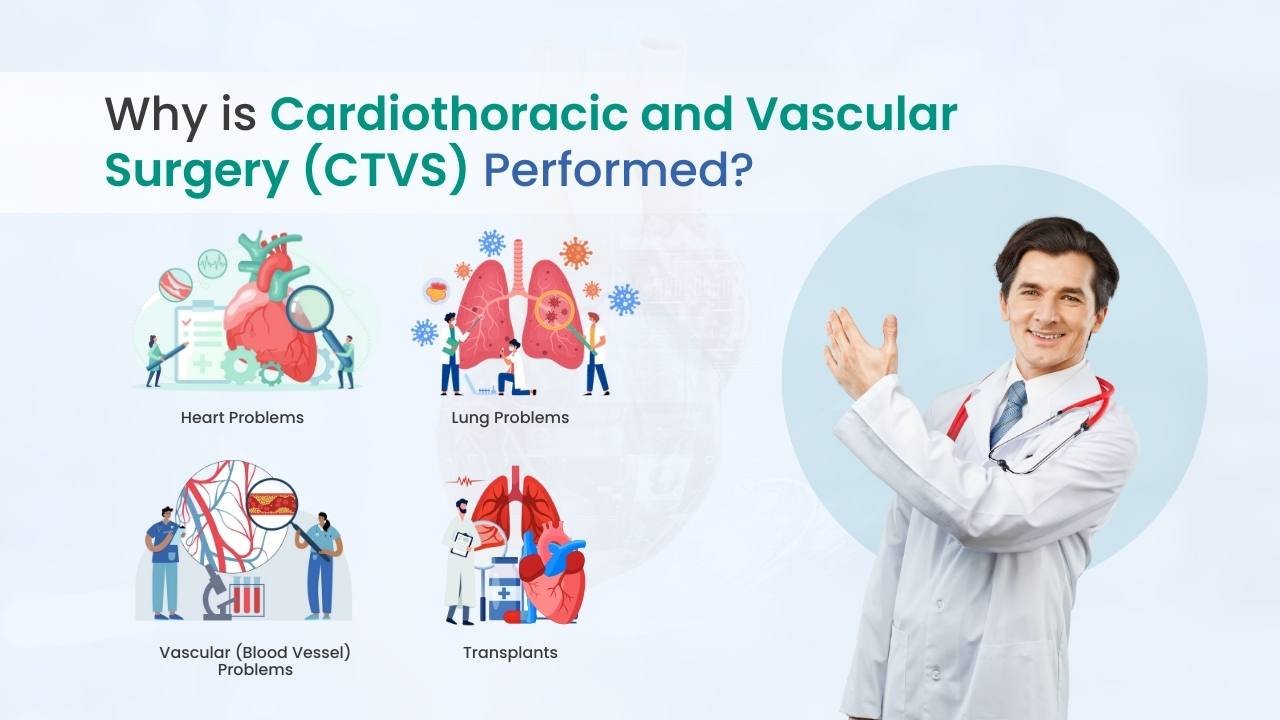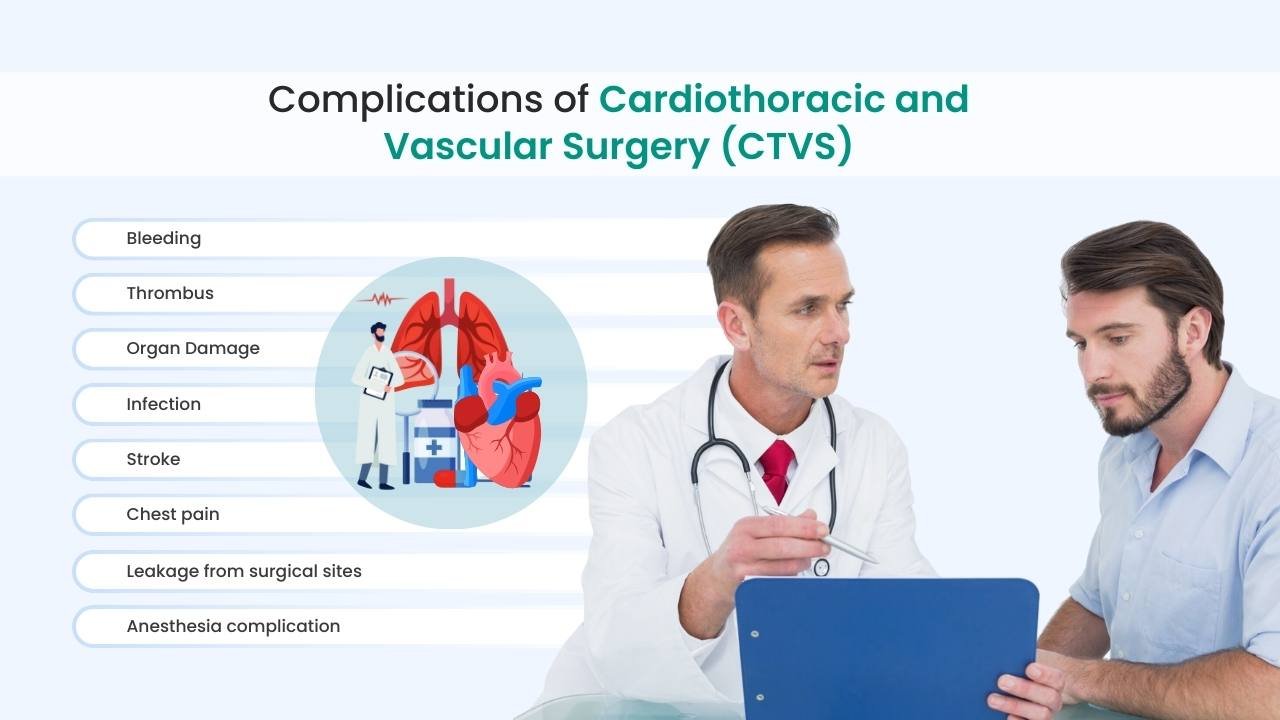Home Blogs Cardiac Surgery Adult Cardiothoracic and Vascular Surgery: An Overview

Cardiothoracic and Vascular Surgery (CTVS) focuses on serious problems with the heart, lungs, chest, and blood vessels. In adult cardiothoracic and vascular surgery, doctors treat conditions like coronary artery disease, valve problems, lung cancer, and aortic aneurysms. These advanced surgeries help patients regain function, enhance their quality of life, and can save lives, providing hope even with some risks involved.
Cardiothoracic and Vascular Surgery helps to improve problems related to the heart, lungs, chest, and blood vessels. This type of surgery is essential for saving lives and improving the quality of life for people with various heart and lung issues.
Cardiothoracic and Vascular Surgery (CTVS) is a medical field that focuses on treating the heart, lungs, esophagus, and major blood vessels in your chest. It is considered a specialized area of surgery performed for conditions like coronary artery disease, leaking heart valves, aortic aneurysms, lung cancer, esophageal cancer, peripheral artery disease, and heart failure. Many patients have recovered from heart-related issues and are now living normal lives.

Cardiothoracic and Vascular Surgery (CTVS) is performed to treat problems related to the heart, lungs, and major blood vessels. These surgeries are performed for many reasons:
• Heart Problems
• Lung Problems
• Vascular (Blood Vessel) Problems
• Transplants

Cardiothoracic and vascular surgery plays a crucial role in treating vascular diseases, providing hope and healing for many people around the world. Although there are some risks involved, the benefits and positive results highlight its importance in improving heart health and overall well-being. With ongoing advancements and caring support, vascular surgeons are helping to create healthier and happier lives for their patients.
FAQs
These surgeries use smaller cuts, so patients feel less pain, have a lower risk of infection, spend less time in the hospital, and recover faster than with open surgeries.
Vascular surgery cost in India is 670 USD-2,670 USD, which is affordable for international patients looking for quality care.
The success rate of adult cardiothoracic and vascular surgery is 95% to 98% in India.
The recovery time varies from 2 weeks to 25 days.
Adult CTVS treats problems like blocked heart arteries, heart valve issues, aortic aneurysms and dissections, lung and chest tumors, and diseases of blood vessels in other parts of your body.
Not all patients can have minimally invasive surgery. It depends on the disease, overall health, and body structure. The doctor decides the best option for each patient.
Recovery time varies depending on the type of surgery and your health. Minimally invasive surgeries usually heal in a few weeks, but more complex surgeries can take longer and may need rehabilitation.
After CTVS surgery, patients should eat a healthy diet, exercise as advised, manage stress, avoid smoking and alcohol, take medicines on time, and visit the doctor regularly.
Vascular surgery deals with blood vessels in the body, not the heart and brain. Cardiovascular surgery includes the heart and the main blood vessels connected to it.
Heart surgeries are usually successful but do carry some risks.
In India, the success rate of CABG is about 95–98%.
Vascular surgery is a type of surgery that treats diseases of arteries, veins, and the lymph system.
Surgery is needed when medicines and other treatments are not enough to manage serious heart and blood vessel problems.

Written By
Hi! I’m Shafaq Khan, a content writer at Mejocare.com, where I create simple, easy-to-understand healthcare content. With 1+ years of experience, my goal is to make health topics clear and helpful for everyone, no matter their background.
At Mejocare, I focus on turning complicated medical information into content that’s both informative and easy to read. Whether I’m writing blog posts, articles, or website copy, I aim to provide useful information that helps people take control of their health and connect with the right healthcare providers.
I’m passionate about helping people access reliable health information in a way that’s easy to understand and act on. If you’d like to connect or have any questions, feel free to reach out!
SOURCE
HISTORY
At Mejocare, we prioritize accuracy and reliability. Our content is based on peer-reviewed studies, academic research, and medical associations. We avoid tertiary references. Learn more in our editorial policy. Trustworthy health information for you.
https://gitaramhospital.co.in/cardiothoracic-and-vascular-surgery-ctvs/ para 3,4,5 https://www.maxhealthcare.in/our-specialities/cardiac-surgery-ctvs para 1 https://www.maxhealthcare.in/our-specialities/cardiac-surgery-ctvs para 3 https://www.fortishealthcare.com/blogs/what-vascular-surgery-risks-benefits-and-recovery para 8
CURRENT VERSION
Our care team can help you.
